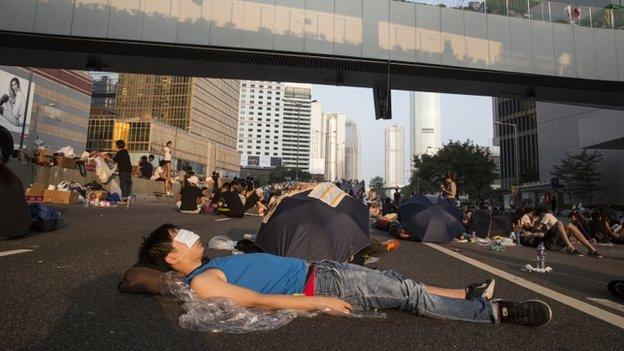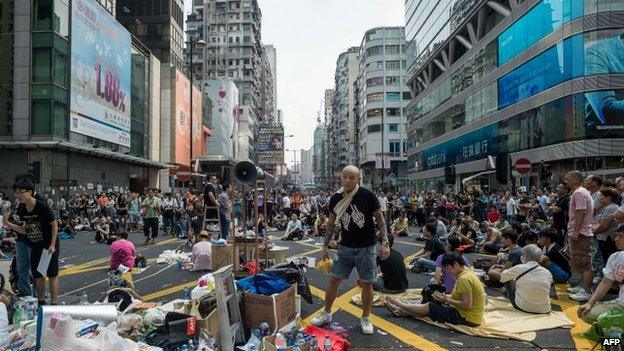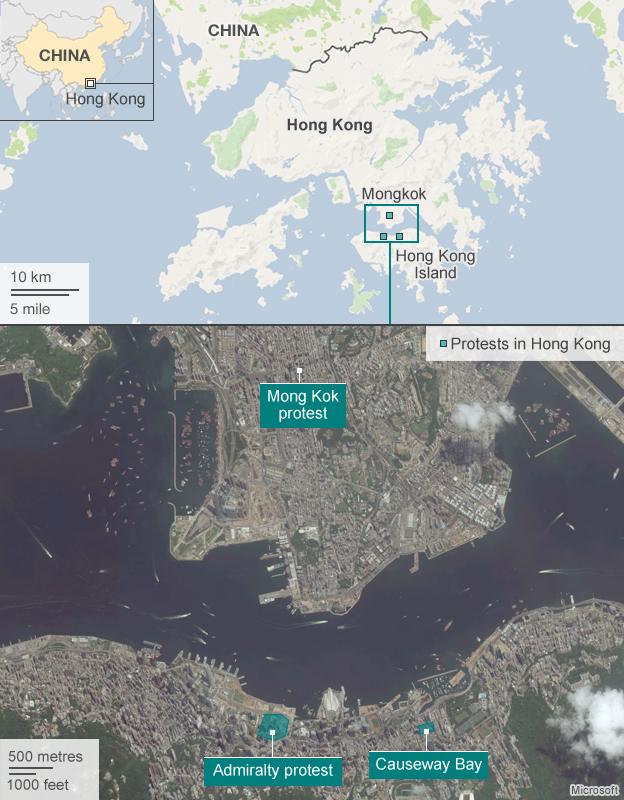Hong Kong protests: CY Leung urges crowds to leave
- Published
A drone captured the scale of the protests on 29 September
Hong Kong leader CY Leung has urged pro-democracy protesters to stop their campaign "immediately", as huge crowds continue to bring parts of the territory to a standstill.
Tens of thousands of people have been blocking streets in several areas.
The protesters want Beijing to give Hong Kong a free vote for its next leader, something Beijing has rejected.
Occupy Central has called on Mr Leung to meet protesters in person on Tuesday night.
During a news conference, the pro-democracy group also said it would open "humanitarian corridors" in protest areas to allow emergency vehicles to pass.
The streets were relatively quiet on Tuesday, with people mainly sleeping and clearing up.
Protesters have set out buckets of water-soaked paper towels in case of tear gas attacks, says Ali Moore.
But crowds were expected set to swell ahead of Chinese National Day on 1 October. Wednesday is a national holiday marking the founding of Communist China.
At the weekend police used tear gas and pepper spray, but riot police have since been withdrawn and protesters remain calm.
Key parts of the city are being blocked by protesters, with some schools and banks closed.
The protesters want Mr Leung, the chief executive, to step down.
But he appeared to reject their demand, saying that his removal would mean Hong Kong's next leader being chosen by a committee, as in 2012, rather than by voters.
He also called on the protesters - who include students, supporters of the Occupy Central group and others angered by the police response to the protests - to go home.
"Occupy Central founders had said repeatedly that if the movement is getting out of control, they would call for it to stop," Mr Leung said.
"I'm now asking them to fulfil the promise they made to society, and stop this campaign immediately."

Many protesters spent Tuesday relaxing and sleeping in the street

CY Leung has appealed to protesters to go home - but many say they are there for the long haul

At the scene: Saira Asher, BBC News, Hong Kong
Thousands of pro-democracy protesters spent Monday night on the street near Admiralty in Hong Kong's Central district. Some were propped up against barricades, others stretched out in the middle of a major road.
After a strong show last night, the crowds have trickled out this morning as people go to work or home to take care of household chores. But they say they will be back later in the evening. This has been the routine now for two days. The crowds diminish in the day but return in full force and stay the night.
The morning was spent mostly removing rubbish left over from last night's huge crowd. Students picked up cigarette butts and plastic bottles, others distributed breakfast buns. That is why those on the street are being called "the politest protesters" by some on social media.
But they are on edge. At one point last night, everyone suddenly stood up and started pulling on masks. It turned out to be just a changing of the guard for the handful of police scattered around here, but the sudden fear was palpable.

'Condemned by history'
Beijing ruled last month that Hong Kong people could elect their next leader in 2017.
But the choice of candidates will be restricted to two or three people who must be approved by the majority of a pro-Beijing committee - meaning Beijing can effectively screen candidates.
In Hong Kong, further consultations had been due to take place on the ruling but on Monday a senior official said these would be postponed until a "better time".
Occupy Central has accused the government of "delay tactics", saying it believed the government was "just hoping people's desire for genuine universal suffrage to fade out over time".

On Tuesday the group said the areas of Mong Kok, Admiralty and Causeway Bay - where protesters have been blocking roads - would become known among protesters as Democracy Square.
In other developments:
A man was arrested after he drove his car at protesters in Mong Kok in the early hours of Tuesday
In the US, a White House spokesman urged the Hong Kong authorities to "exercise restraint" and protesters to "express their views peacefully"
UK PM David Cameron says he is "deeply concerned" about events in Hong Kong and hopes the standoff can be resolved
Not everyone in Hong Kong backs the protests. Some fear the ongoing demonstrations could affect relations with Beijing or hit the economy of the financial hub.
China has called the demonstrations illegal and urged the Hong Kong government to bring them under control.
News of the protests is being heavily censored in mainland China. Media have blamed "radical opposition forces" for stirring up trouble.
Analysts say Communist Party leaders in Beijing are worried that calls for democracy could spread to cities on the mainland, putting them in a very difficult position.
Britain handed Hong Kong back to China in 1997 under a "one country, two systems" formula that guarantees liberties not seen on the mainland, including freedom of speech and the right to protest.

Hong Kong democracy timeline
1997: Hong Kong, a former British colony, is handed back to China under an 1984 agreement giving it "a high degree of autonomy, except in foreign and defence affairs" for 50 years
2004: China rules that its approval must be sought for changes to Hong Kong's election laws
June-July 2014: Pro-democracy activists hold an unofficial referendum on political reform and a large rally, which is followed by protests by pro-Beijing activists
31 August 2014: China says it will allow direct elections in 2017, but voters will only be able to choose from a list of pre-approved candidates; activists stage protests
22 September 2014: Student groups launch a week-long boycott of classes in protest
2017: Direct elections for chief executive due to take place
2047: Expiry of current agreements